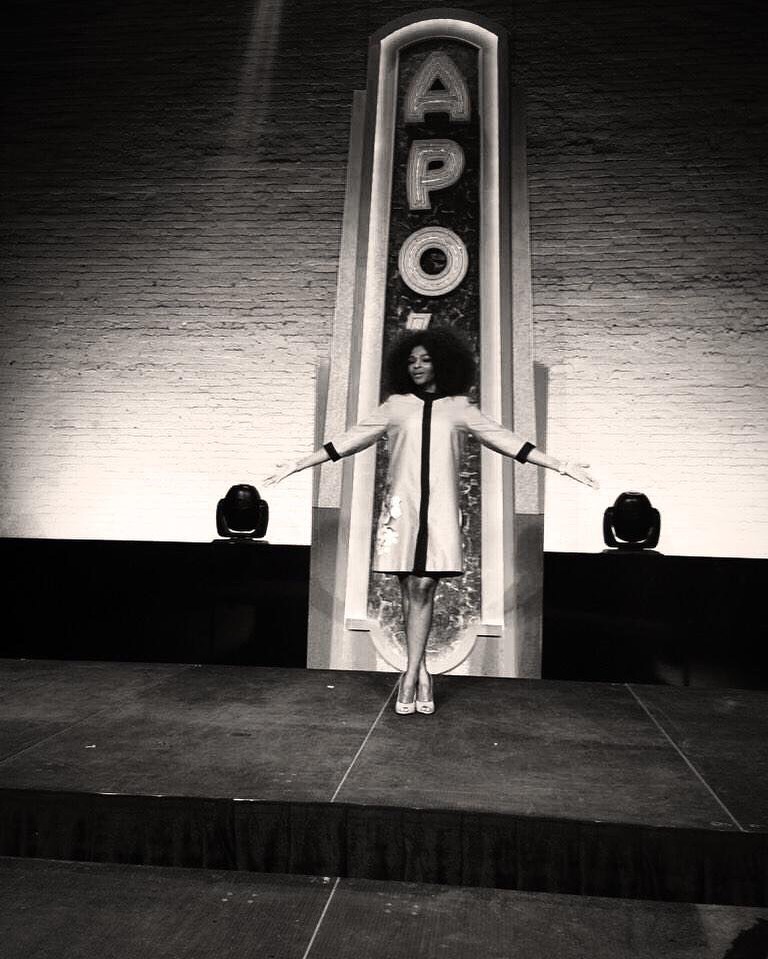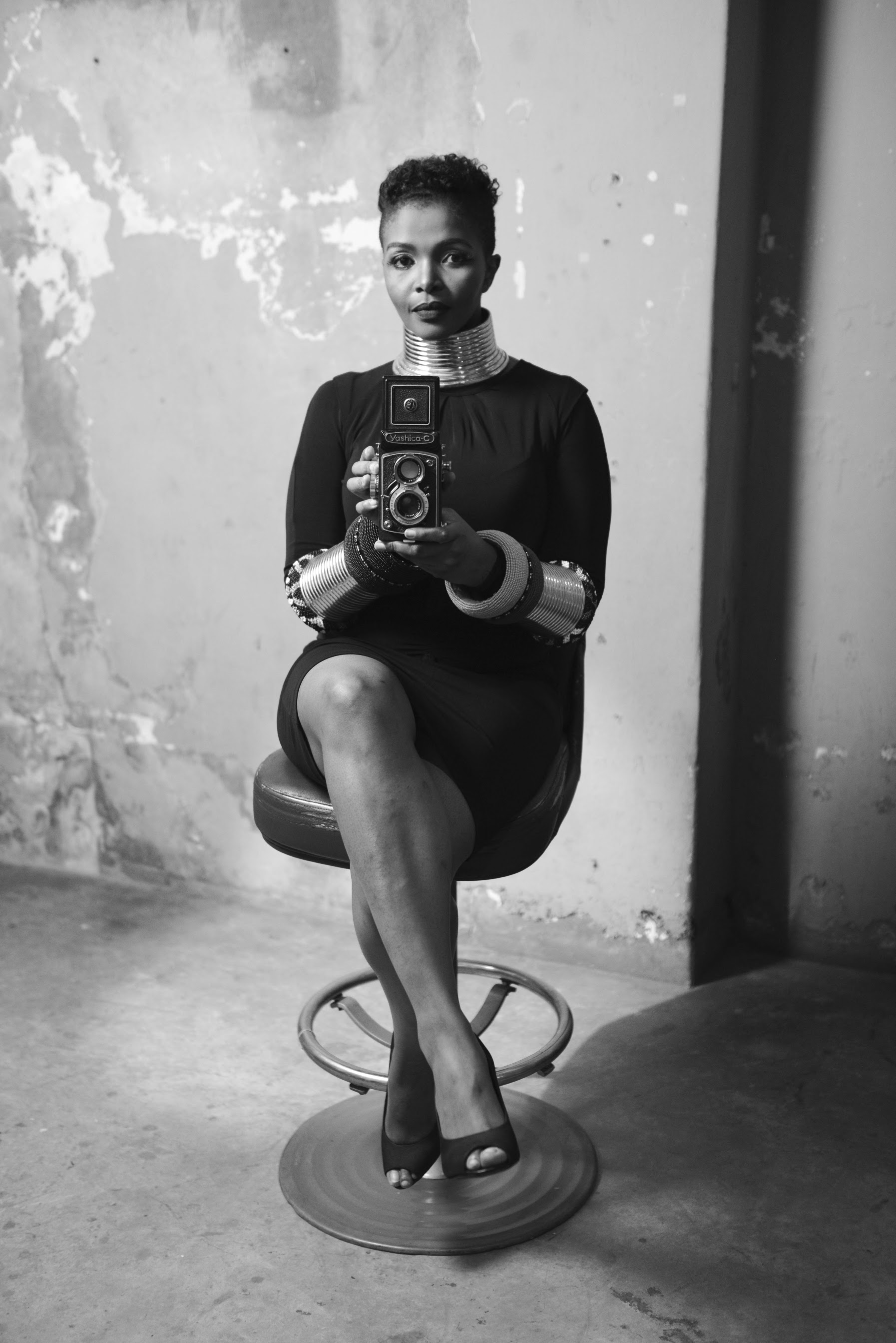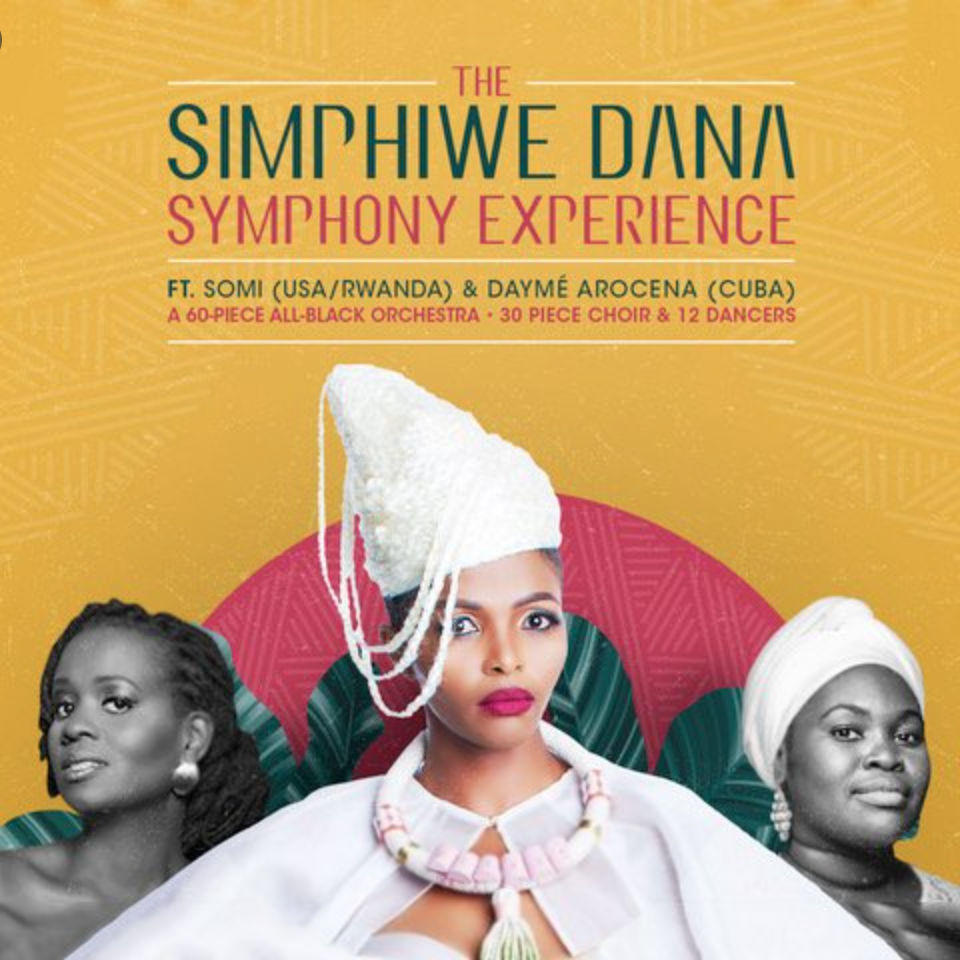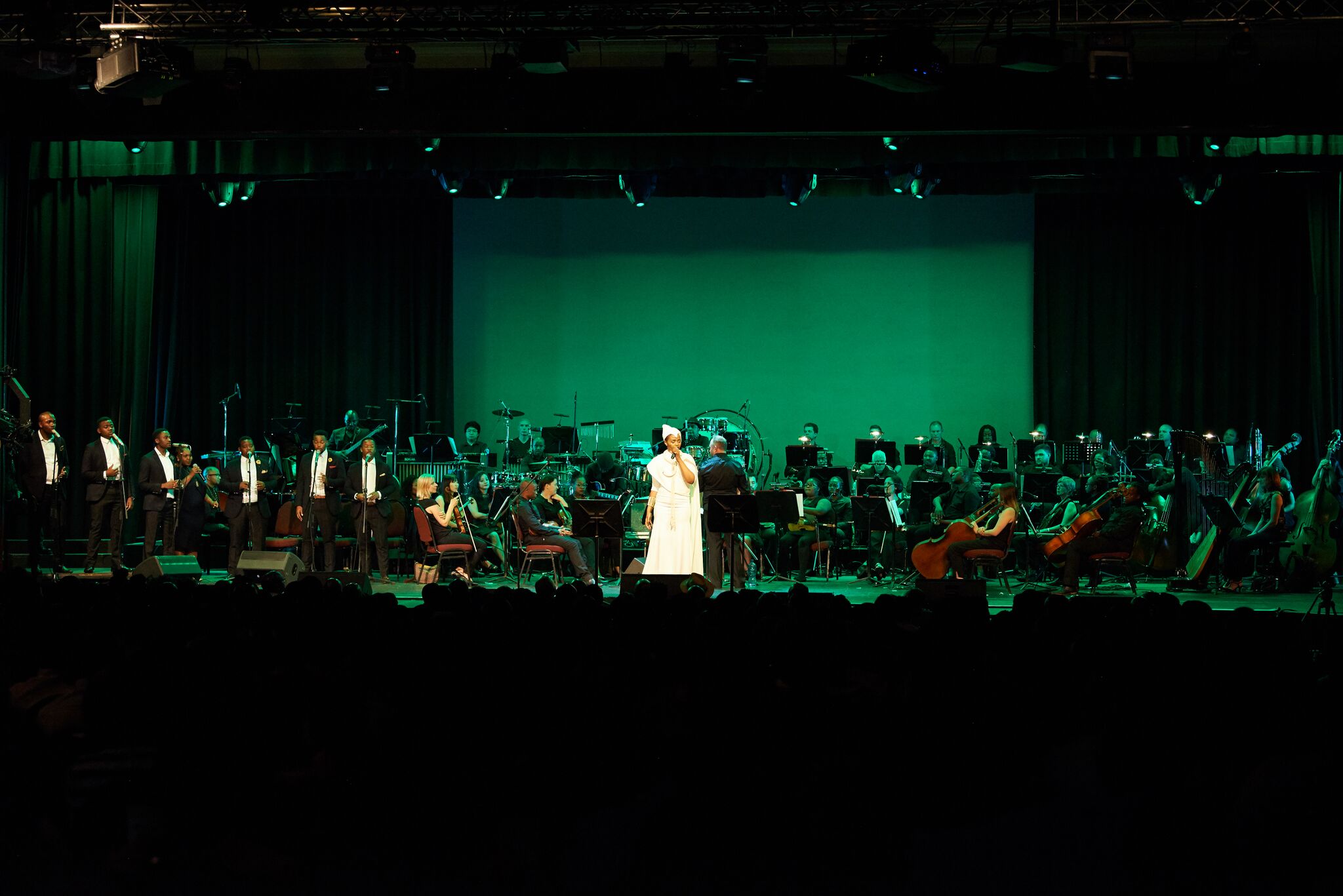1980, Gcuwa in the Eastern Cape, Republic of South Africa, marked the birth of Simphiwe
Dana, a multiple award winning music force. That birth, though with other self-discovery and
life paths that saw her pursue graphic design and information technology studies, had always
had an artistic nature and anchor. Dana’s art early formation and nurturing include her
mother’s soulful and impassioned singing, to ‘unknown’ but life force talent that flowered
and permeated Johannesburg small clubs and music scene, to the almost perfect on arrival
professional debut with the 2004 recording, commercial and critical success of her debut
album Zandisile. Her debut was followed by The One Love Movement on Bantu Biko Street
in 2007, Kulture Noir in 2010, Firebrand in 2014, and An Evening with Simphiwe Dana Live
In Concert and, the 2016 Simphiwe Dana Symphony Experience, featuring Buika and Asa.
Dana’s discography, the intellectual and spiritual content of her art primarily pulses with the
Xhosa cosmology of her cultural background, is Afrocentric in its temperament and identity,
while at the same time possessing a measured and poignant universality in the exploration
and articulation of what it means to be human. Zandisile came almost perfectly formed not
because of some technical trickeries, but because the album manifested unwavering quality
into the recording standards of the South African, continental and even world jazz standards
and historicity, while charting innovative and futuristic accents in the formation and
evolution of her art.
It is no small feat that comparisons, references and artistic kindred spirits vacillated between
Miriam Makeba, Busi Mhlongo and Dorothy Masuka - marking Dana´s arrival, presence and
work in the music realm and by implication continental heritage iconography mature and
universally resonant. Her ground-breaking and standard setting artistic output has, however,
managed to court comparisons with jazz greats like Makeba while at the same time resisting
being boxed. Her craft is charged and beams with individualistic finger prints and
particularity, such that public relations cross referencing and comparisons with musical
personalities and events on the African continents and wider world stage denote individual
brilliance and star quality rather than protégée limitations. In a sense, Dana’s music and
artistic instincts mark her as a force because of the manner of her dispositions – the spiritual,
intellectual, political and revolutionary instincts that colour each song and anchor her social
being and postures as a much admired and often misunderstood public figure. From Zandisile
to her other albums, Dana displays an astute and timeless lyrical command of what it means
to fall in and out of love in songs like Iliwa Lam, My Light, and Ndim Nawe; songs that have
become embedded in our social consciousness. Her political instincts, commentary,
consciousness and revolutionary drive find expression in Thwel’Ubunzima, Bantu Biko
Street, and Vukani, while personal urgency tracks with societal echoes include Ndiredi,
Zundiqondisise, or Umzali Wam. Critically and analytically, the average time gap of four
years between album recordings and carefully selected and curated live performances speak
to her unending quest for artistic purity and weight, such that the repertoire that forms the
backbone of the musical palette remains fresh and commanding. The consistent and unique
quality of her music, social activism and vision on tropes such as education and racism, with
an understated feminist register, is woven into the music without it being distracting or
inconsistent with the grand narrative of her work as an artistic being.
Dana’s continuing prominence on stages at home and abroad, her deliberate long bouts of
calculated silence and retreats insofar as new artistic projects are concerned, have a dual
benefit: that of endearing her to her predominantly musically mature legion of fans because
rarity breeds preciousness and mystery, while affording the artist time to reflect on and
consider new ideological and sonic landscapes. Her recent pilgrimage to Mali and
collaboration with Salif Keita, herself (Mali) a cradle of rich fusion of African cultures and
music, is indicative of her conscious search for and elevation of ancient sounds and wisdom
from the mother continent. The retracing and celebration of the African past, balanced with
the African present, with a gravitation into an African artistic future, with dual existence with
a global music catalogue, is a mark of great artistry and individuality on her part.
In a world of crass and fickle artistry, what gives Dana’s music endurance and flair – like
great painters and writers of yore – is her commitment to record the pains and thrills of an /
our age with lyrical content and perceptive sensitivity that projects understated beauty and
timelessness. A Dana record does not date, but matures and continues to penetrate the
smallest and obscurest crevices of our social fabric, our collective and often vain snobberies
when we opine and submit to the medicinal and spiritual dimensions of art. This explains
why a new Simphiwe Dana album is such a highly celebrated and anticipated occurrence in
our artistic and heritage timeline: because there is foreknowledge on the part of her audience
that great and artistic depth and moral luminance will continue to anchor the overall
architecture of her profound talent and its transformative sonic powers. What is instructive
and self-evident is how songs like Mayine, Ndiredi, and Tribe have, during countless live
performances, undergone such dazzling and majestic re-interpretations while preserving and
maintaining their original studio spark and pulse. Her skill and ability, to master the creation
and guarded evolution of her music, is what separates her as a great artist from fleeting
entertainers.
The latest album, Bamako, is a creative evolution milestone of incredible range. It has, as is to
be expected with rooted and centered artists, a Dana- esque familiarity. The evolution is, in
the main, new orchestration in terms of the interplay between compositions and vocals, such
that musical time is stretched, compressed, slowed, and steadied – with the overarching
emotive and cerebral response to the music demanding astute listening. The compositions are
diverse: playful, intense, atmospheric, some celebratory with a tinge of lyrical melancholy.
At a creative plane, Bamako is a breath-taking fusion of musical styles and traditions; with
distinct overtures to a multiplicity of places: traditional Malian music with its trance inducing
vocal chants and blues inspired guitar work in Ali Farka Toure signature, reminiscent of
iconic recordings such as Talking Timbuktu or In The Heart of the Moon¸ or Salif Keita’s
spiritually uplifting and sacred mastery of voice and emotion. It, surprisingly and tastefully,
appropriates and reclaims the reggae and dancehall grooves of the Caribbean in Gwegwezela
and You Keep Calling, to Cuban come Spanish guitar tonality resultant from a cross
pollination of West African and Cuban music in the Afro Cubism Buena Vista Social Club
style, so ably and memorably maintained by the likes of Cesaria Evora.
Love is, with all its charms and afflictions, thematically at the core of Bamako in terms of
lyrical content, criss-crossing songs such as Bye Bye, Kumnyama, Usikhonsile, and One. Like
Dana’s preceding work, Kitchen Girl tackles the complexities of history, touching on South
Africa’s history and present of kitchen ‘girls’ and garden ‘boys’- a history of colonial and
apartheid exploitation and dispossession. Of compassionate yearning is a partial remix of
Salif Keita’s Africa, a duet that becomes Ndimonele, sentiments of which are a call to African
unity and solidarity.
Bamako is in many ways a listener´s album; it commands immersive listening that rewards
with discreet but intense sensual pleasures. It is also, a musicologist and composer’s
recording in how it presents a beautiful myriad and tapestry of cross cultural references and
sanguine passions. It brews feeling, suggests a distant yet tangible nostalgia, beauty in a
pressure cylinder. This is music that breaks and mends your heart with tactile sensuality,
which sets the imagination alight, music made for connoisseurs, for varied moments and
social rituals: intimate friendships and celebrations, scorching love affairs, lonesome
evenings on elevated balconies overlooking crimson horizons. The sheer force embedded in
the music is destined to make this album an immediate and timeless classic, for the flirtatious
charm of its string of sonic masterpieces. A lot of time, love of craft, soul meditation have
been invested in the conceptualization of this record: echoes, the dynamism and multiple
registers of vocals, the contrast between space and emotive but strangely liberating
claustrophobia, the Xhosa and Bambara vocal fusion on One, the solid spine of bass and
adventurous intensity of blues rock guitar wizardry that is woven into some of the songs.
The ultimate authority and power of this music is how it escapes and resists categorization –
for its palette is wide yet focused, detonating whole fragments of jazz, blues, rock, traditional
African sounds, reggae and dancehall, soul, Ghanaian and Nigerian high life music, even
enchanting calypso accents. It is impossible for the ear to filter the album in its entirety in
one sitting, so this is one of those projects that come once in a lifetime, whose songs are
whole worlds on their own, that penetrate the deepest membranes of consciousness and
feeling. Bamako is fully deserving of the accolade of world music, not only as a genre, but
because a passionate and assured stream of humanity runs through its heartbeat, its gaze, the
comfort of its embrace that makes music a dependable ally in the rigors and puzzles of life
and living.
Wherever & whenever you need us. We are here for you – contact us for all your support needs, be it technical, general queries or information support.

Publisher

Senior Reporter

Editor

Photographer







